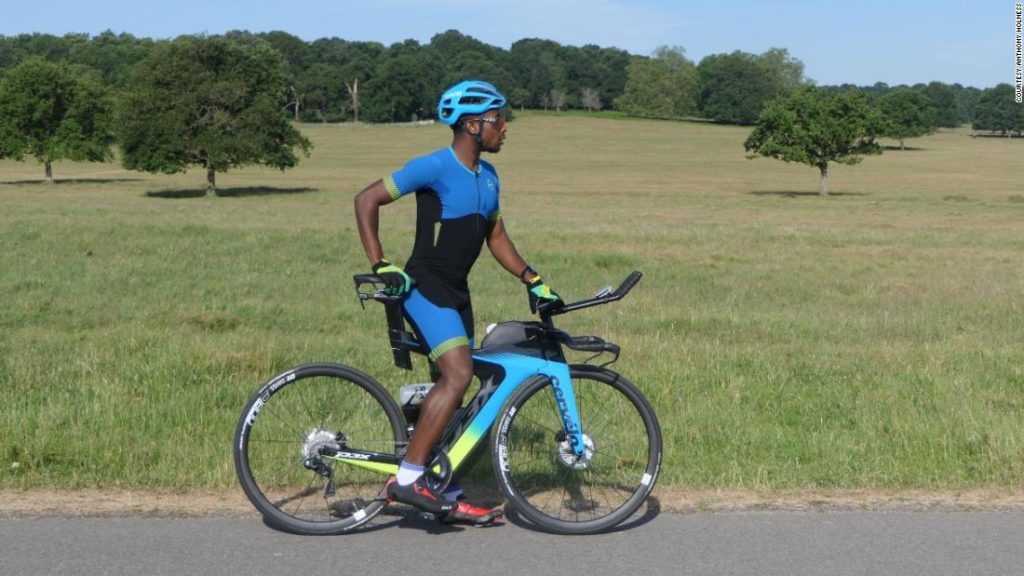“And you can see why,” grins Anthony.
Anthony, 62, vividly recalls the moment he first took Sam down to the swimming pool — the instructor insisted he could teach Sam to swim in only an hour.
“[I said] ‘If you can teach him to swim in an hour, I’ll book 10 lessons,'” Anthony remembers. “And half an hour later, he took off the armbands and Sam was up and down in the pool.”
‘Super Sam’
Cycling didn’t come as naturally to Sam though, as due to his autism, he has weaker motor skills. However, he’s not easily distracted, focusing on tasks until he masters them.
Such tenacity and persistence is how he came by the moniker “Super” Sam, as he considers his autism a superpower.
“Every time I do sport, autism has built up my confidence, self-esteem and reduces my stress and I don’t get bored easily.”
Holness’ former trainer David Blackwood also views Sam’s ability to not be easily put off by repetitive tasks as a strength.
“I would go beyond saying that he could be equivalent to athletes without physical disabilities,” says Blackwood. “Sam could potentially beat someone without any physical or mental disabilities.”
“He gets on with things and he focuses on the basic tasks at hand. He is relentlessly disciplined in achieving them, and we know that in most sports: repetition, discipline and consistency are the basic fundamental things that will get you most of the way.”
The Ironman World Championship, held in Kailua-Kona, sees competitors tested over an epic 140.6-mile journey which starts with a leviathan 2.4-mile swim in the harbor.
After completing the swim, athletes then set off on a 112-mile bike ride across the scorched island before finishing with a full 26.2-mile marathon.
In a sport that combines three disciplines, Holness isn’t overwhelmed by his rigorous six day a week training schedule.
“Currently, I’ve been doing indoor cycling between two to three hours, run approximately 22 kilometers a week, an hour plus rowing, an hour strength and conditioning — and if gyms were open — I’d be swimming over 2,000 meters,” he says.
After getting up around 9 a.m., Holness might start a typical day with a peanut butter and jelly bagel, scrambled eggs, nuts and a bottle of water.
Training would then involve a two-hour run around Richmond Park in west London, a sprint or row after lunch and then yoga after dinner.
“After training, no aches and pains,” he says confidently.
“You will never see Sam tired,” adds Blackwood. “You’ll get him to do three laps of Richmond Park and there will be a couple of beads of sweat and he’ll say that he’s ready to do it all over again.”
A role model
Holness’ triathlon endeavors has proven to be an inspiration for families of disabled children in the UK.
“When I speak to families of parents, the word they always use with me is hope and it makes us humble as well,” says Anthony. “Now [that] they’ve seen Sam, they think there’s a future.”
Recently, Holness connected via Zoom with some students at the Janus Academy, a specialist autistic school in Canada.
“It was really energizing for our kids to be able to see somebody who has autism, who is so excellent in what it is that they do,” Carlene Chrumka, executive director of the Janus Academy, told CNN. “That was a real special moment for our kids.”
While schools like the Janus Academy help children on the autism spectrum to realize their full potential, when Sam went to his local school, he was told he wouldn’t achieve much academically.
Undeterred, Sam went on to achieve a 2:1 in Sports Science from St. Mary’s University in Twickenham.
Chrumka says that teachers often don’t understand the learning methodologies children on the spectrum require
“Working with people on the autism spectrum takes specialized training and I think that that’s one of the components that’s missing when we’re looking at mainstream schools.”
It’s a sentiment echoed by Jolanta Lasota, chief executive at charity Ambitious About Autism, in which Holness acts as an ambassador.
“It is a real barrier for young people and parents and carers.”
“There is a lot of misunderstanding about autism and — sometimes — people have low expectations for autistic people and that’s why we need better awareness in schools, in the community, in employers about the potential that autistic people have to offer.”
Holness is also frequently the only Black competitor at triathlon events.
British Triathlon CEO Andy Salmon admits that triathlon is still underrepresented among ethnic minority groups as well as among disabled people. “It’s about seeing the right role models,” he says
“It’s about making our programs more accessible, so we’re currently doing a very targeted initiative to work with partners in local communities in areas that wouldn’t have perhaps thought about triathlon as something that they can do.
“The early indications of that are that it’s working really well.”
Blackwood adds that when he attended an Ironman in Lanzarote, he and his friend were the only two Black people there. It didn’t occur to him that triathlon could have been an option for him growing up.
“Part of it was not having role models within that sport that were out there on TV, inspiring young children in their hearts and minds that they can be this,” he says.
“We now have Sam. If you give Sam a bigger platform, he reaches way more ethnic minority children and that will then inspire them.”
You may also like
-
Super League: UEFA forced to drop disciplinary proceedings against remaining clubs
-
Simone Biles says she ‘should have quit way before Tokyo’
-
Kyrie Irving: NBA star the latest to withhold vaccination status
-
Roger Hunt: English football mourns death of Liverpool striker and World Cup winner
-
‘Every single time I lift the bar, I’m just lifting my country up’: Shiva Karout’s quest for powerlifting glory

